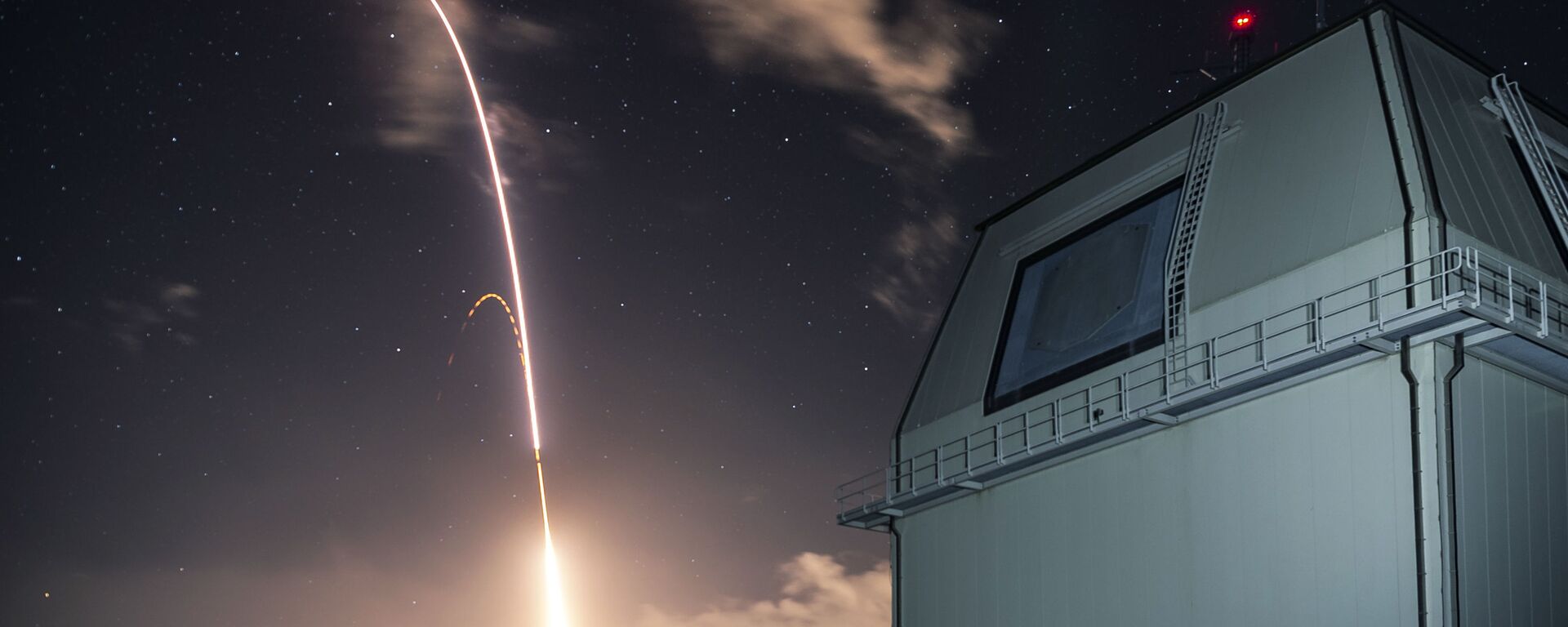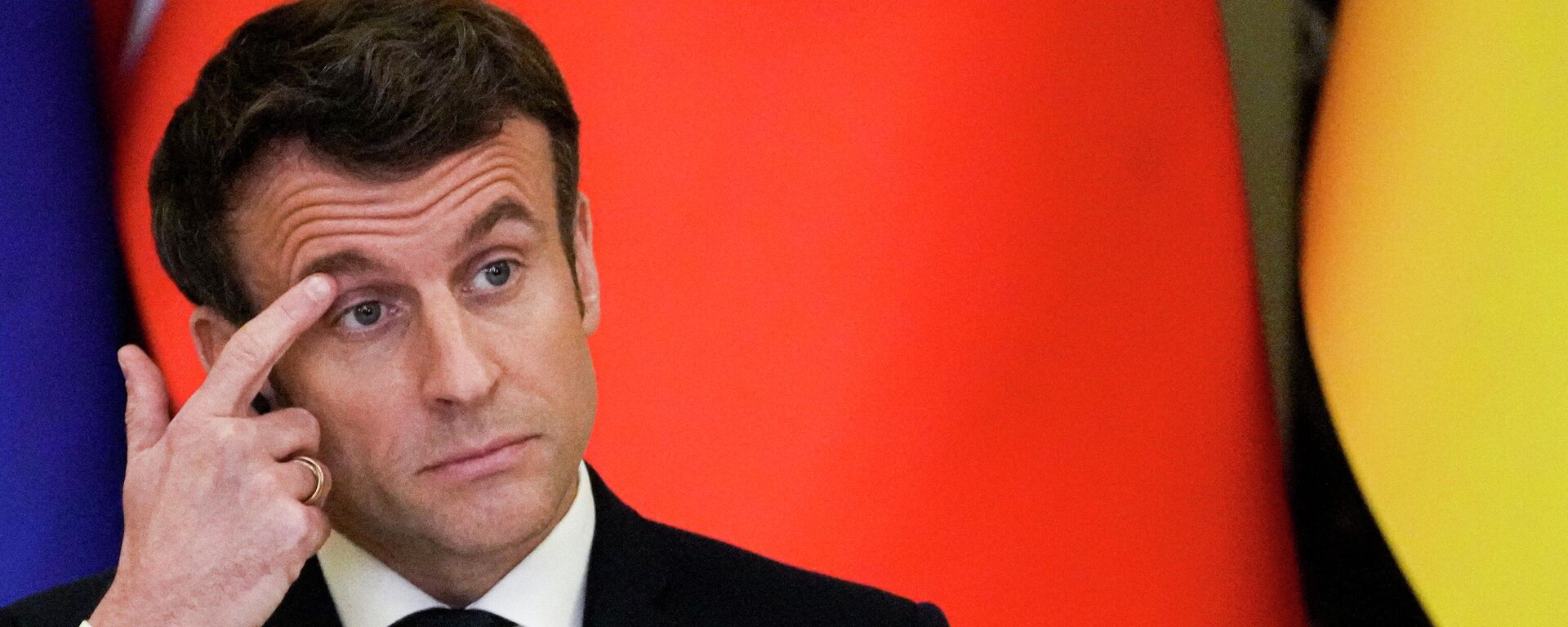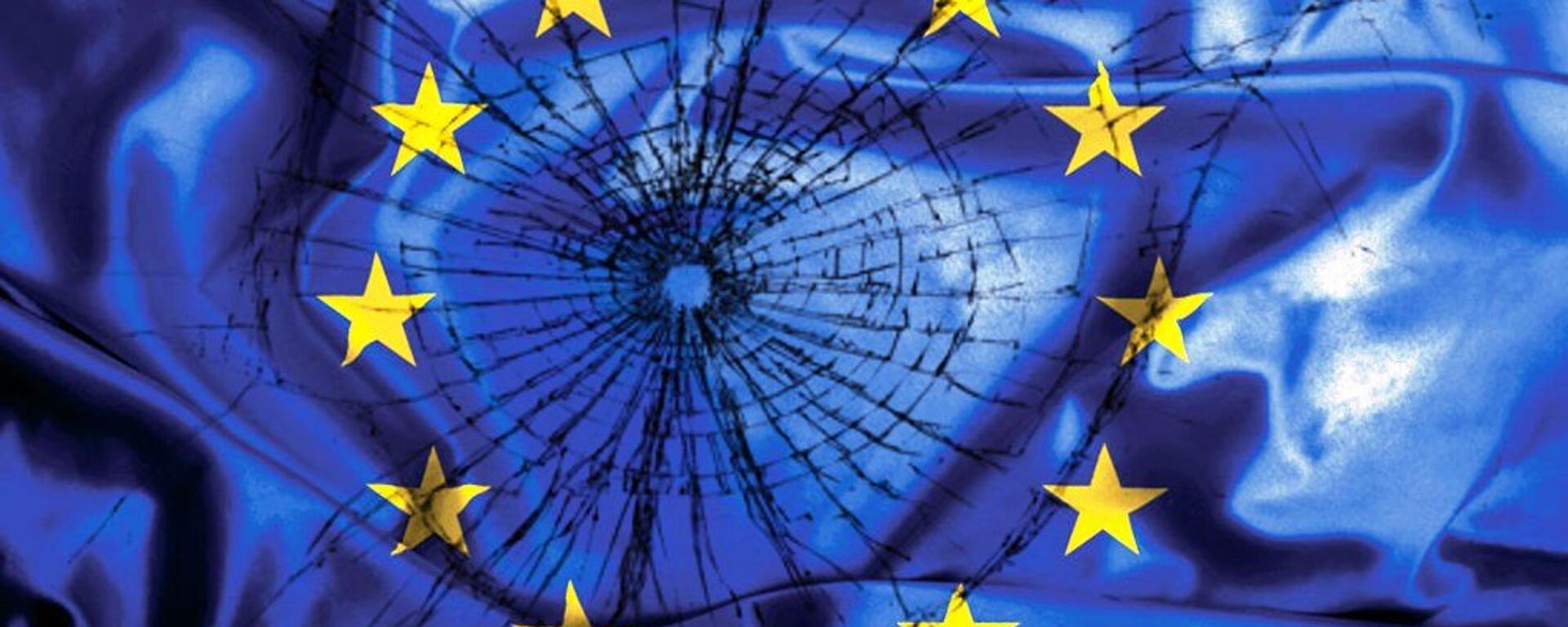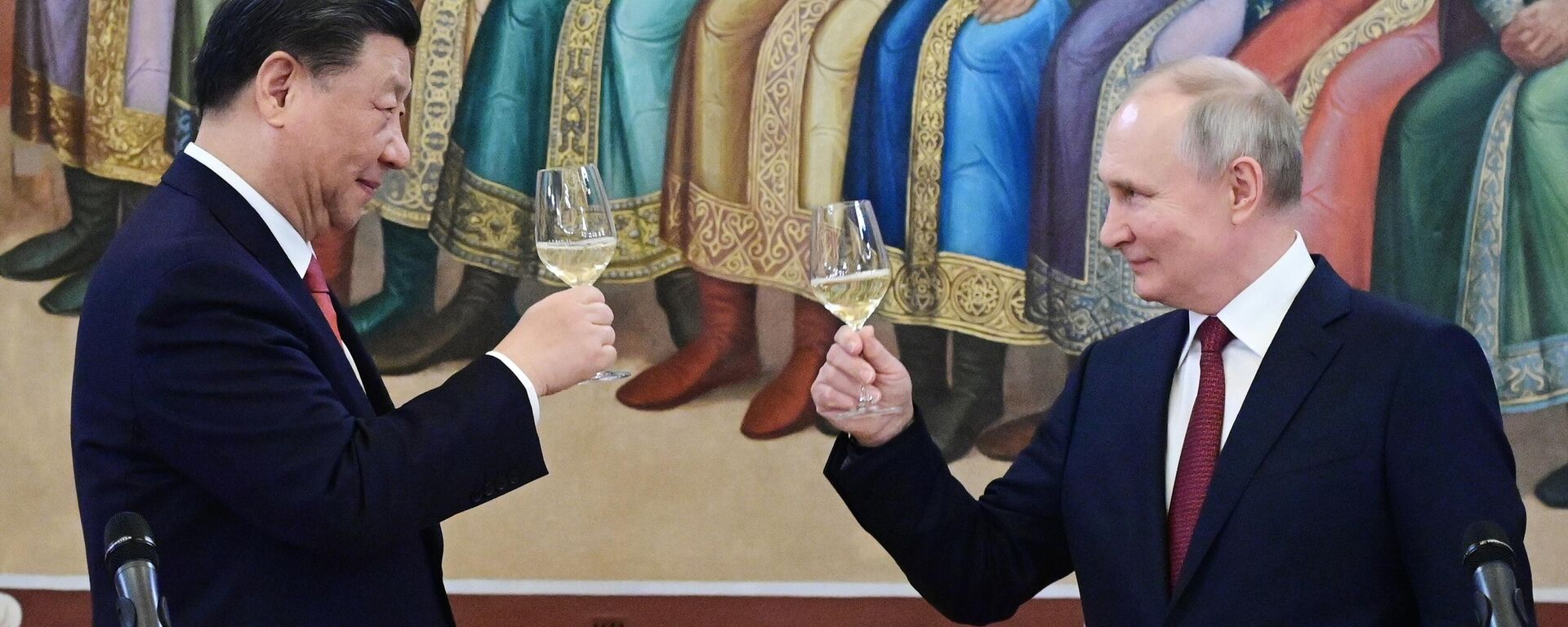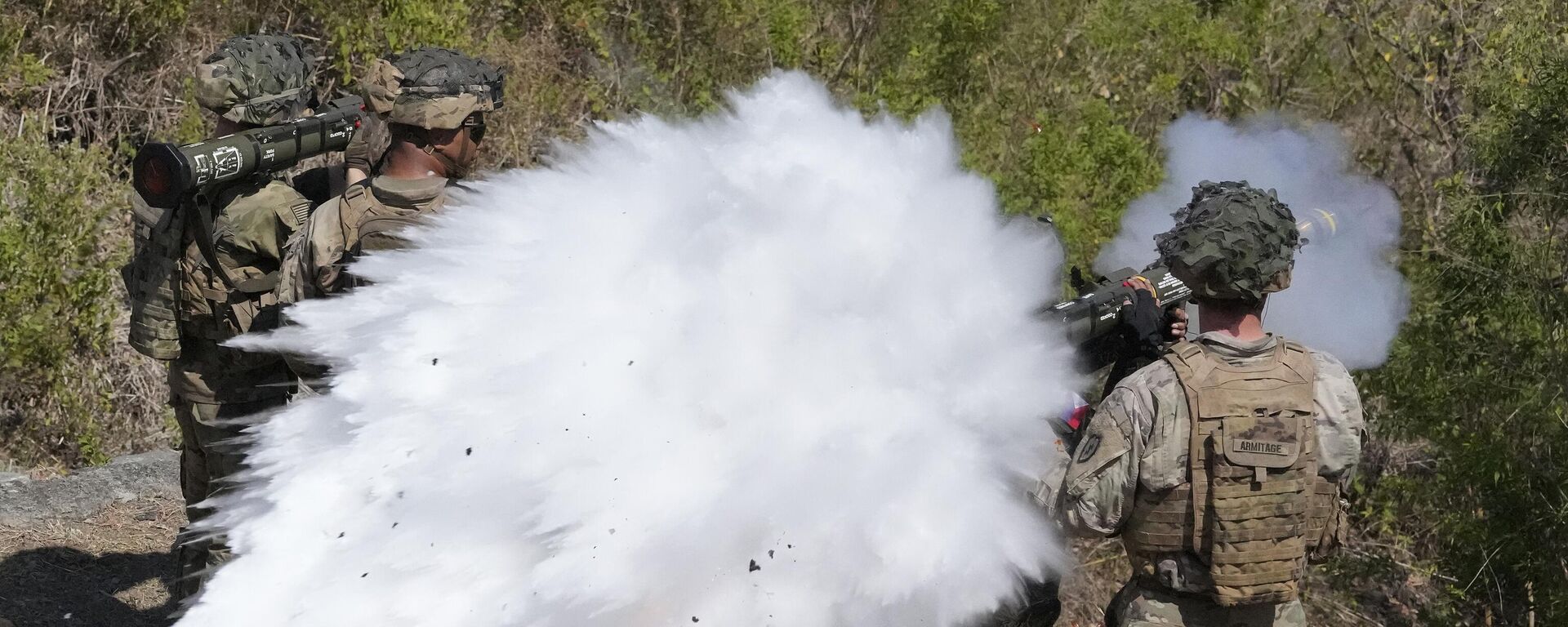History Repeating Itself? Europe's New Militarization Echoes WW2
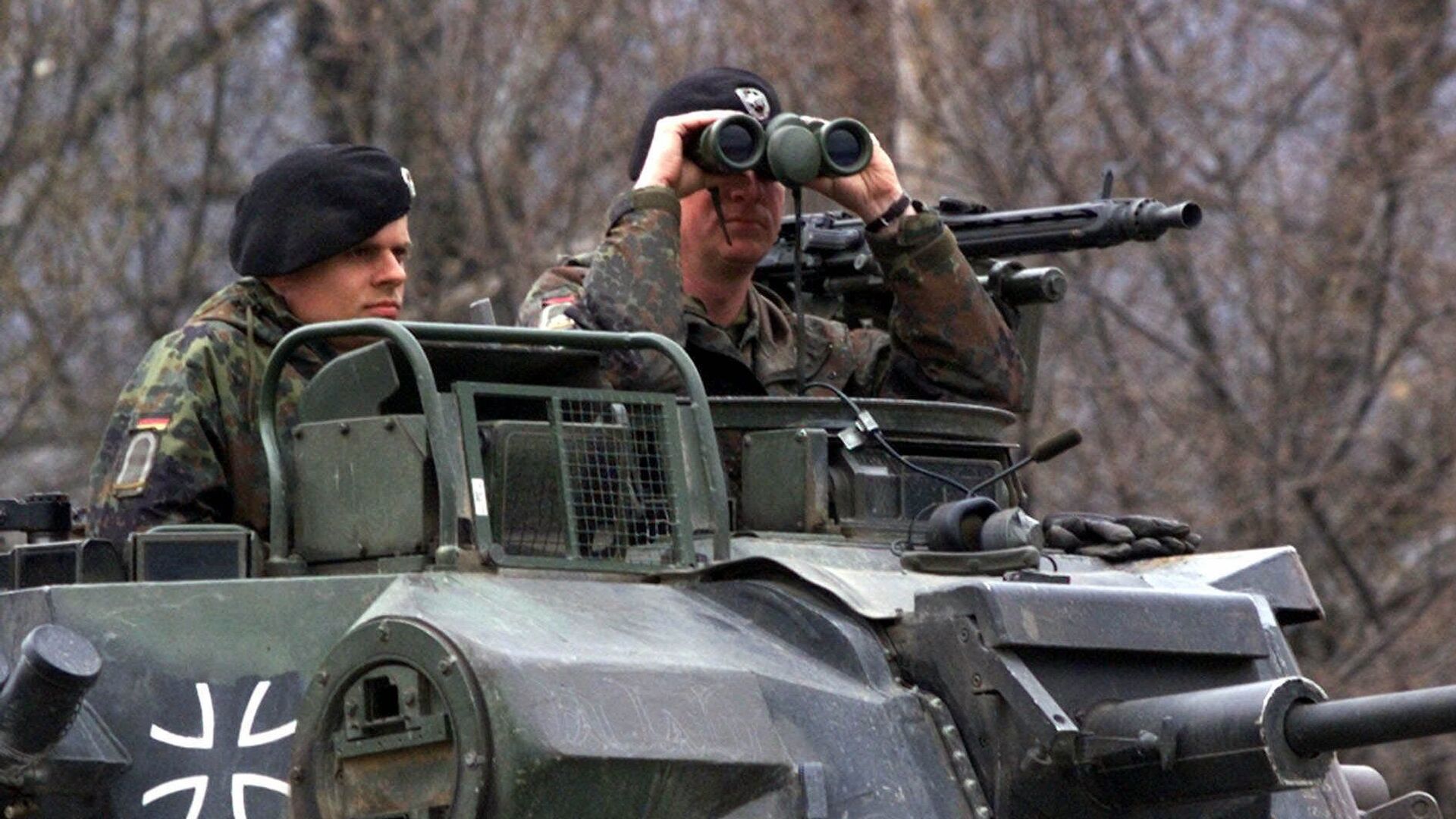
© AP Photo / Laurent Rebours
Subscribe
Longread
Military expenditures by Central and Western Europe nations for the first time surpassed that of 1989 in real terms, according to the Stockholm International Peace Research Institute (SIPRI). Paolo Raffone, a strategic analyst and director of the CIPI Foundation in Brussels, sat down with Sputnik to discuss the ongoing militarization of Europe.
"There is no military or strategic reason to justify the heavy rearmament of all European NATO members," said Paolo Raffone, stressing that neither Moscow nor Beijing are threatening the military bloc and its members. "While Russia has contiguous territory to the NATO bloc, China is far away on the planet and cannot possibly be considered as a military threat to European states. Therefore, it is quite clear that the NATO members’ rearmament is dictated by the geostrategic interests of the hegemon power, the United States that is militarizing Europe."
Earlier, SIPRI revealed that Central and Western European states' military spending reached a whopping $345 billion in 2022. Some of the sharpest increases were registered in Finland (+36%), Lithuania (+27%), Sweden (+12%) and Poland (+11%). Meanwhile, the combined defense budgets of the EU and the UK are five times greater than Russia’s and exceed those of China.
The Western press is trying to justify the surge in military expenditures by pointing to Russia's special military operation to demilitarize and de-Nazify Ukraine. However, one needs to keep in mind that the militarization of Europe started well before the Russian special op.
In particular, in 2012, the Obama administration set up the Aegis Ashore anti-missile defense complex in Romania which became operational in 2016. In addition, the construction of a similar site started with delays in Redzikowo, Poland. Russia has repeatedly signaled that the deployment of anti-ballistic interceptors was upsetting the strategic balance in Europe, but the US claimed that the missile installations were aimed against Iran's hypothetical nuclear arms.
Meanwhile, from February 2014, when US-backed coup plotters illegally seized power in Kiev, to 2021, Washington had shelled out $2.7 billion in military assistance and training to Ukraine.
Following the onsent of the special op in Ukraine, the collective West dramatically ramped up weaponry deliveries to the Kiev regime. As a result, Ukraine saw a 640% hike in 2022, which is the highest single-year increase in a country’s military expenditure ever recorded by SIPRI's data. Thus, since February 2022, Washington has shelled out $35.7 billion in weapons and training to Ukraine, according to the recent US State Department's factsheet. Washington's partners worldwide have provided or committed over $13 billion in security assistance, as per the report.
"Inciting the European states to support Ukraine militarily and with military supplies implies that the European military stocks need replenishment," said Raffone. "It means buying new equipment from the US with an evident MIC profit. It is very hard to find a shed of legitimacy in this whole process. The EU has been condemned by its main ally, the US, to a future of economic decay and political and strategic dependency."
International observers argue that major European countries are not in position to step up their defense spending as inflation continues to bite and living standards keep plummeting. Deprived of Russia's cheap gas, Germany is facing further de-industrialization. The destruction of the Nord Stream pipelines, which, according to Pulitzer Prize-winning journalist Seymour Hersh, was carried out by Berlin's NATO allies, the US and Norway, has made matters worse. France has been engulfed by social unrest largely prompted by the economic slowdown with the nation's debt rating having been downgraded to AA-. It still raises the question whether or not the Old Continent will avoid a recession in 2023.
Looking Back at History's Lessons: USSR's Anti-Nazi Coalition Plan
The ongoing militarization of Europe and Ukraine bears a strong resemblance to the developments prior to the Second World War, according to international observers. They have drawn some parallels between Moscow's initiative to halt the militarization and Nazification of Ukraine and strengthen common security in December 2021 and the Soviet Union's efforts to form an anti-Nazi coalition starting in December 1933.
Speaking to Sputnik back in September 2017, Michael Jabara Carley, a professor of history at the Université de Montréal, noted that the USSR had did its utmost to establish a united front against Nazism, which was snubbed by Western European nations.
For nearly six years, the Soviet government worked tirelessly to promote collective security in Europe. Still, Soviet offers of cooperation were spurned in France, Britain, Romania and Poland. The promising rapprochement between the USSR and the US after meetings between President Franklin Roosevelt and Commissar for Foreign Affairs, Maxim M. Litvinov, in the autumn of 1933 was sabotaged by the Sovietophobe faction in the US Department of State.
Poland de facto derailed Moscow's efforts by signing a non-aggression pact with Nazi Germany on January 26, 1934. A number of European states followed Warsaw's suit. On September 30, 1938, in Munich, Europe's major powers – Britain, Germany, France and Italy – negotiated an agreement permitting Nazi Germany's annexation of the Sudetenland region of Czechoslovakia. Needless to say, Moscow and Prague were excluded from the negotiations of the pact. In mid-March 1939, Nazi Germany swallowed up all of Czechia, turning Slovakia into a puppet state. Czechoslovakia's highly developed military industrial complex came in handy for the Nazi military machine.
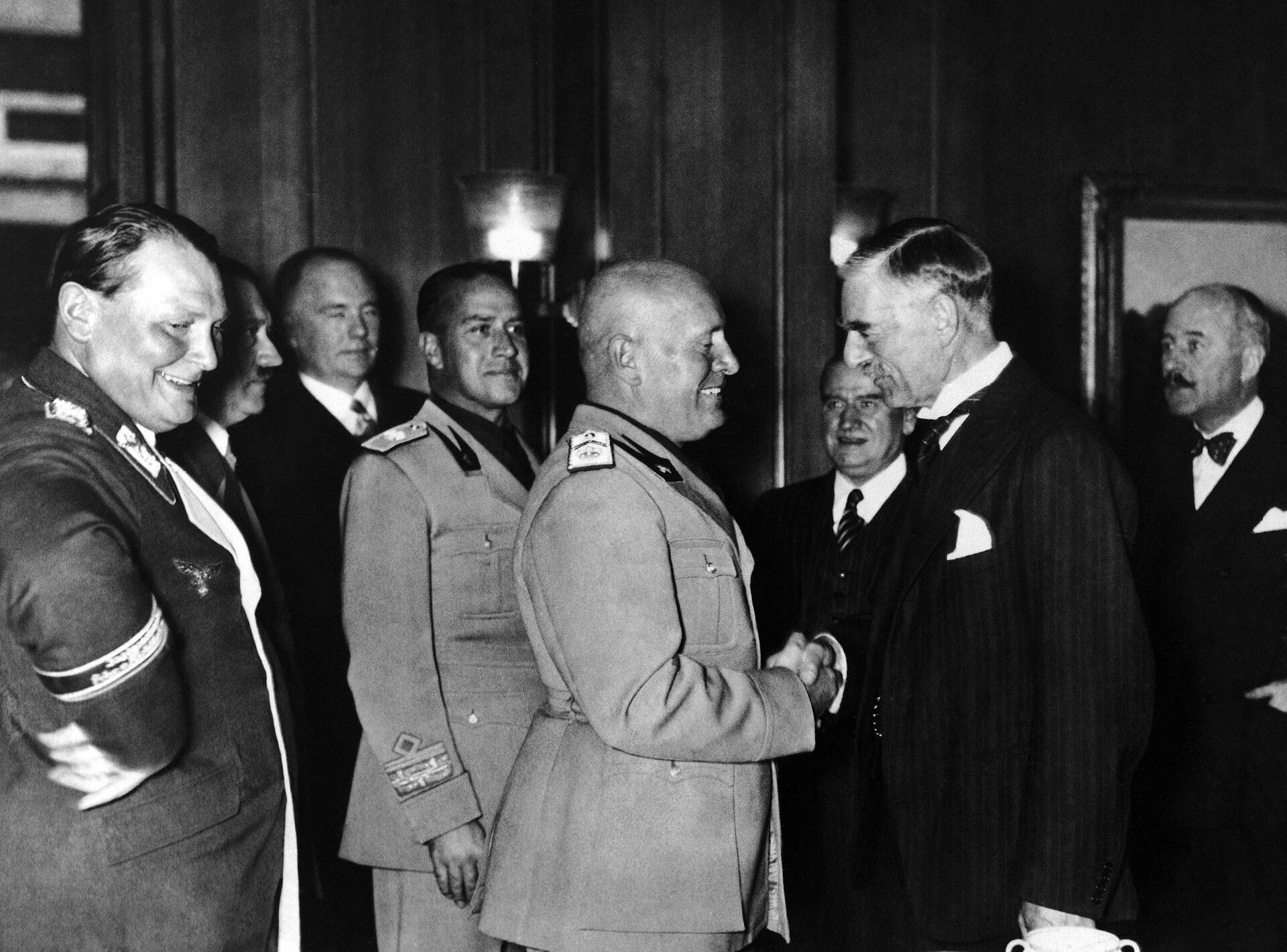
From left to right are: Reichsmarschall and President of the Reichstag Hermann Goering, Italian Foreign Minister Count Ciano and Italian Fascist Leader Benito Mussolini shaking hands with Prime Minister of Great Britain Neville Chamberlain during the Four Power Conference held in autumn 1938 in Munich, Germany. Others not identified
© AP Photo / Hoffman
The Munich pact heralded the failure of the USSR's effort to form an anti-Nazi coalition. Historians argue that after that, the Soviet Union had just one way to buy time ahead of the war already in the air, namely, to do exactly what other European powers had already done, to strike a non-aggression agreement with Hitler.
Very soon, however, Hitler violated all the non-aggression agreements, occupied Poland and a number of other European states. On June 22, 1941, Nazi Germany and its Axis allies invaded the USSR. Apparently, nothing like this would have ever happened and tens of millions of lives would have been saved, if the Europeans had agreed to form an anti-Nazi coalition with the Soviets in the early 1930s, historians argue.
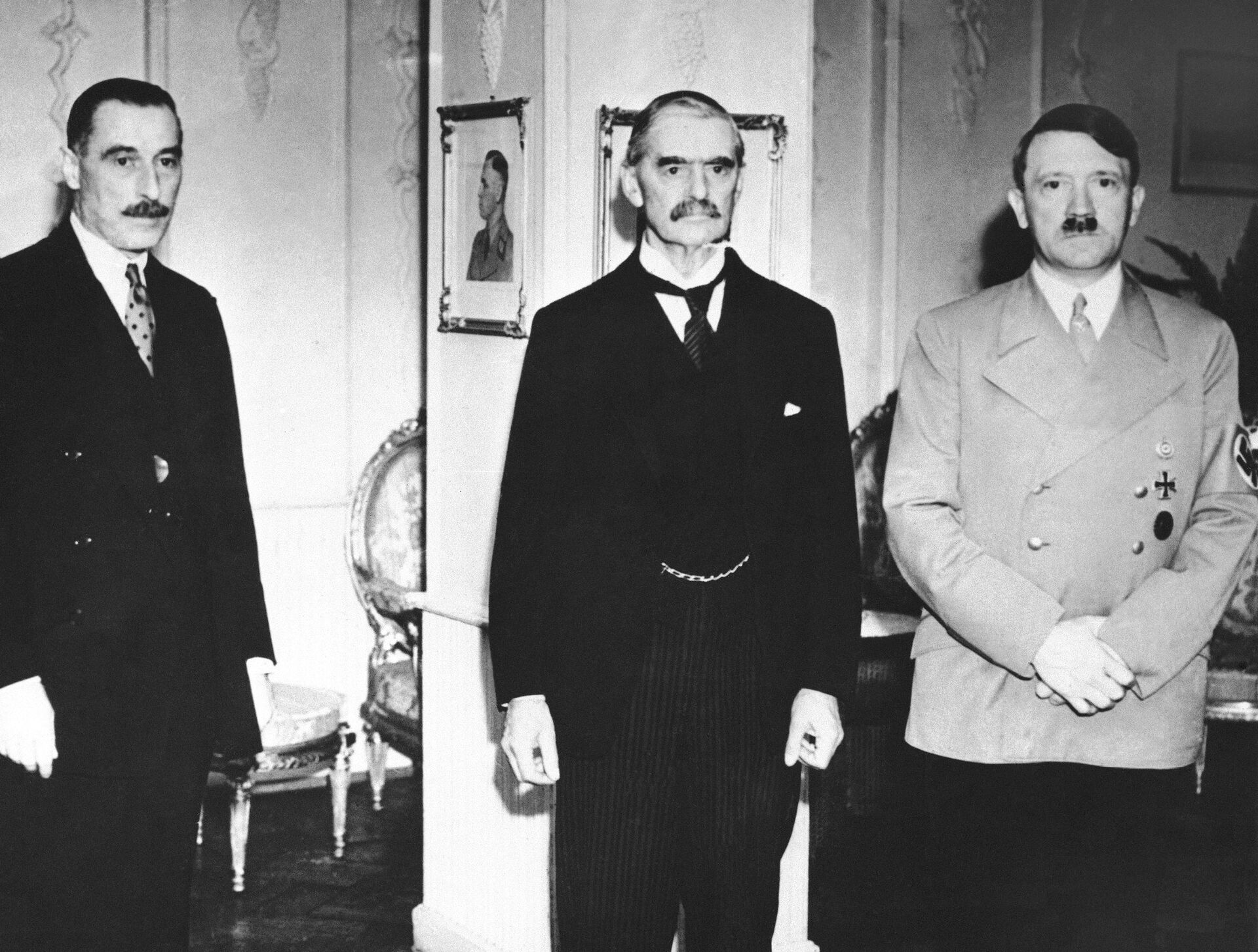
Neville Chamberlain, British prime minister, center, with Reichsfuehrer Adolf Hitler, right, at the second of their three dramatic meetings to solve the European crisis at the conclusion of the three-hour midnight conference which ended in disagreement in Hitlerís hotel room in Godesberg, Germany around Sept. 23, 1938
© AP Photo
Europe's Militarization and NATO's Expansionism
The militarization of Europe is accompanied by the expansion of the Cold War-era NATO bloc which resumed its eastward march in 1997 despite its main rivals, the USSR and Warsaw Pact ceased to exist by December 1991. Most recently, Sweden and Finland gave up their neutrality status and applied for NATO membership.
"Accepting the formal explanation that gives absolute freedom of choice to countries to decide joining NATO, I do not see any concrete advantage for the countries that are already members," said Raffone. "On the contrary, the expansion to Sweden and Finland further complicates the strategic divergences within NATO. Currently there are three incompatible sets of strategic interests: Northern, led by Poland; Central, led by Germany; Southern, without a clear leadership."
Eventually, following the 2024 elections the US may strengthen bilateral security agreements by cherry picking the states of their interest and abandoning others to their destiny, the expert suggested.
"Poland and Ukraine are in pole position to become bi-lateral US military and security partners," he said. "The rest of the 'allies' of the US in Europe will need to assume their own responsibilities and costs (a refrain that comes from the time of the Obama administration, bluntly reinforced with Trump, and not changed with Biden)."
Raffone projected that the weaponization of Europe and the EU combined with the economic consequences of sanctions and the decoupling from Russia and China could push the electorate to more conservative right parties in 2024. He went on to suggest that the indirect effect of NATO's activities and expansion would guarantee the US that European politicians would voluntarily subdue American interests on all grounds.
"With the exception of the embattled president of France, all other leaders, particularly, conservative right ones, are already happy servants of US interests," Raffone remarked.
Russia and China's Peace Initiative
Europe's ongoing militarization is accompanied by the militarization unfolding in the Asia-Pacific region. Most recently, the Pentagon moved to accelerate weapons deliveries to Taiwan. Likewise, the US is stepping up military ties with the Philippines.
Philippine and US defense and foreign policy chiefs discussed the development of nine Philippine military sites, where American troops would be staying indefinitely. As a result of the agreement, the American military would be able to establish strongholds and surveillance outposts in the northern and western Philippine provinces allowing Washington to extend its control to the South China Sea and the Taiwan Strait.
The developments come within the framework of Washington's bid to clamp down on Russia and China simultaneously.
Moscow and Beijing are closely monitoring Washington's military adventurism in Europe and in the Asia Pacific. Russia and China are two powers which sustained the biggest losses during World War II and they learnt the lesson well.
Earlier this year, China and Russia shared their joint vision of a fairer multi-polar world order, free of aggression and militarization. Beijing released its new Global Security Initiative Concept, which lays out practical measures to address current security challenges. The document particularly states that "the Cold War mentality, unilateralism, bloc confrontation and hegemonism contradict the spirit of the UN Charter and must be resisted and rejected."
Russia signaled its support to China's 12-point initiative for peace in Ukraine. Back in March 2022, just a month after the beginning of its special military operation, Moscow suggested Kiev sit down and sign a peace agreement. Preliminary accords were reached in late March 2022 in Istanbul with Russia starting to implement its part of the agreement.
However, Ukrainian President Volodymyr Zelensky tore the accords up at the collective West's encouragement. At the time, EU foreign policy chief Josep Borrell claimed that the Russo-Ukrainian standoff should be solved on the battlefield. Since that time, the US and its NATO allies have been flooding Ukraine with weapons, some of which, eventually, have found its way to black markets posing new challenges to peace.
History has once again reached a crossroads. Will the nations of the world make the right choice this time?

